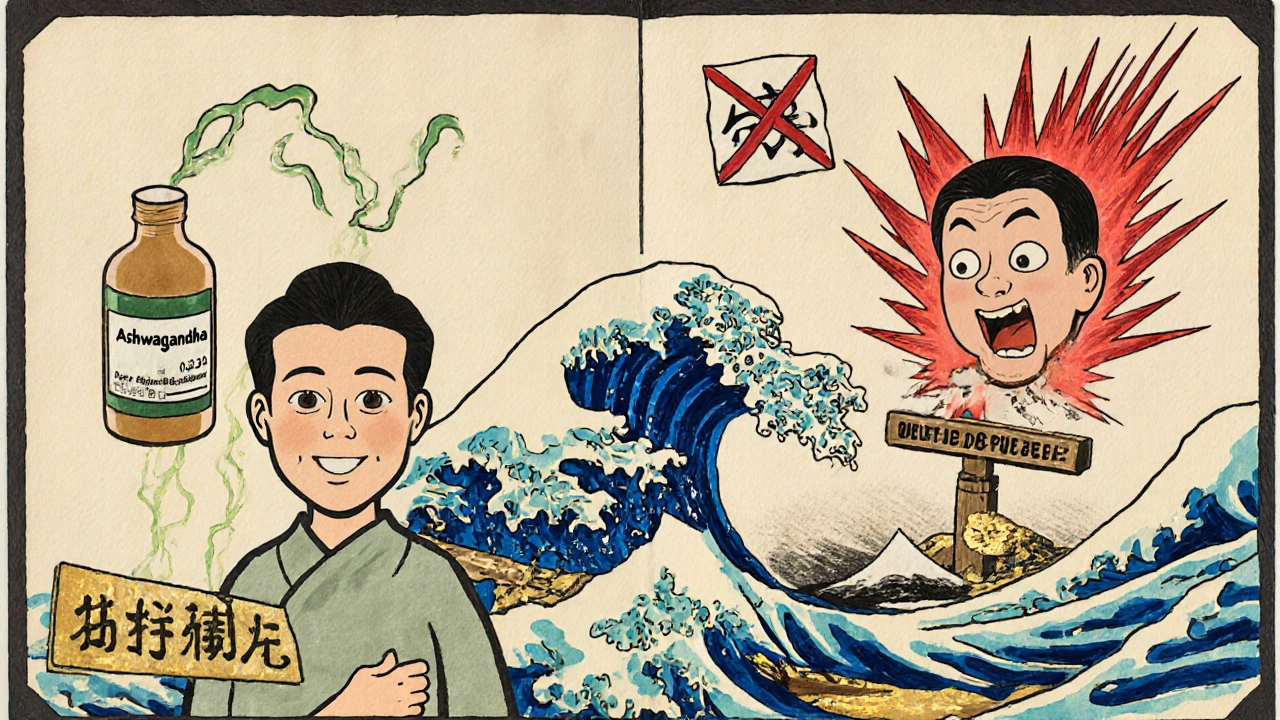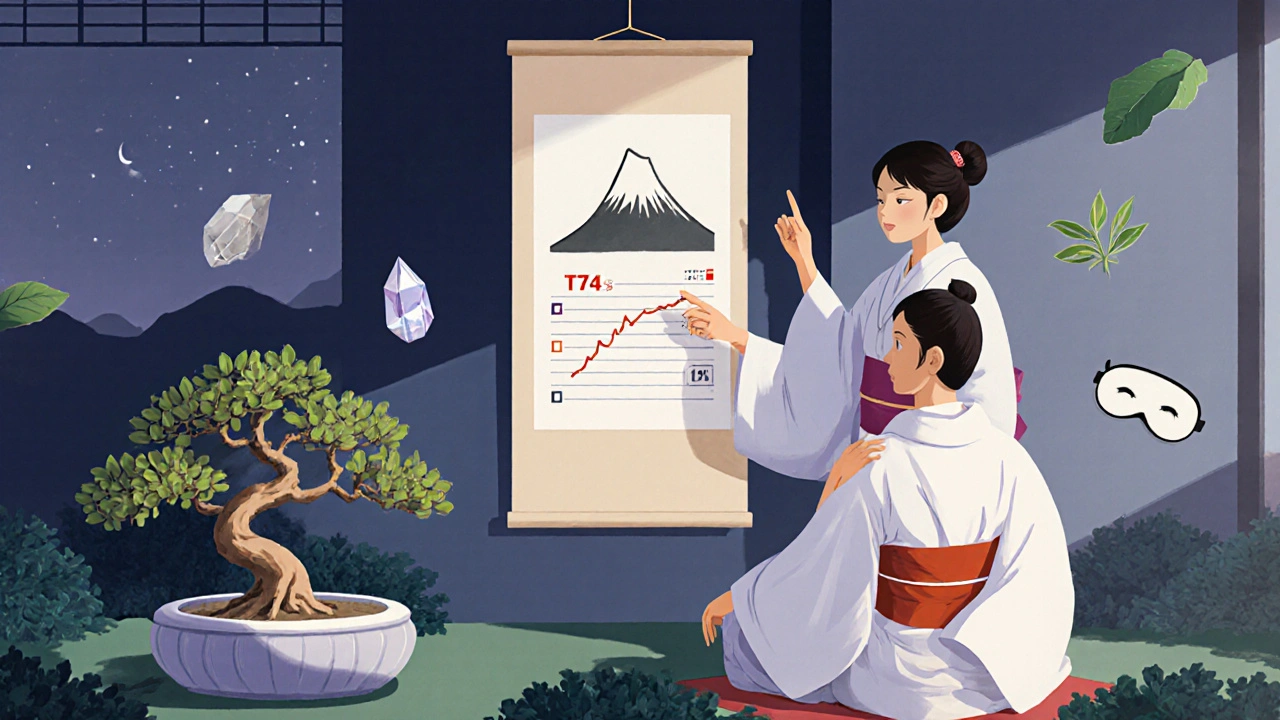
Thyroid Medication Interaction Checker
Input Your Medication Details
Ashwagandha Details
Many people turn to ashwagandha for stress relief, better sleep, or to boost energy. It’s natural, widely available, and marketed as safe. But if you’re taking thyroid medication like levothyroxine (Synthroid) or liothyronine, this herb could be quietly pushing your hormone levels into dangerous territory - without you even realizing it.
What Ashwagandha Actually Does to Your Thyroid
Ashwagandha isn’t just a calming herb. It directly affects your thyroid gland. Research shows it can increase thyroid hormone production. In a 2018 clinical trial with 50 people with subclinical hypothyroidism, taking 600 mg of standardized ashwagandha daily for eight weeks raised T3 levels by 41.5%, T4 by 19.6%, and TSH by 17.5%. That’s not a small effect. That’s a major hormonal shift.These changes happen because ashwagandha contains withanolides - especially withaferin A and withanolide D - that stimulate the hypothalamic-pituitary-thyroid (HPT) axis. This is the same system your thyroid medication is designed to balance. When you add ashwagandha on top of prescribed thyroid hormone, you’re essentially double-dosing your body with thyroid signals.
Why This Is Dangerous With Thyroid Medication
Thyroid medications like levothyroxine are dosed down to the microgram. A 100 mcg pill isn’t just a suggestion - it’s calculated to keep your TSH between 0.5 and 2.5 mIU/L, depending on your condition. Too little, and you stay fatigued. Too much, and you risk heart palpitations, bone loss, anxiety, and even atrial fibrillation.Ashwagandha throws that balance off. The American Association of Clinical Endocrinologists documented 12 cases of thyrotoxicosis - dangerously high thyroid hormone levels - directly linked to ashwagandha use in people on thyroid meds. In one case, T4 levels spiked above 25 mcg/dL. The normal range is 4.5 to 12.0. That’s more than double the upper limit.
And it’s not rare. A 2022 survey of over 1,200 thyroid patients found nearly 1 in 5 who took ashwagandha alongside their medication developed symptoms of hyperthyroidism. Almost 30 of them ended up in the hospital.
The Supplement Problem: You Never Know What You’re Getting
Here’s the kicker: ashwagandha supplements aren’t regulated like drugs. The FDA doesn’t test them for strength, purity, or consistency. A 2021 test by ConsumerLab.com found the same branded product varied from 1.2% to 7.8% withanolides across different batches. That’s a six-fold difference in active ingredients.One bottle might have enough to nudge your thyroid up slightly. The next might send you into crisis. If you switch brands, or even buy a new bottle from the same brand, you’re playing a game of hormonal roulette.
And manufacturers aren’t required to warn you. The Dietary Supplement Health and Education Act of 1994 lets them sell ashwagandha without proving it’s safe to take with prescription meds. The FDA has issued 12 warning letters to companies for making false thyroid claims - but enforcement is weak. You’re on your own.
Real Stories: What Happens When People Mix Them
On the Thyroid Help Forum, a user named ‘ThyroidWarrior’ took 500 mg of ashwagandha daily with 100 mcg of levothyroxine. Within six weeks, their TSH crashed from 1.8 to 0.08 mIU/L. They developed heart palpitations and couldn’t sleep. They had to go to their doctor for an emergency dose reduction.Another person on Reddit, ‘HypoThyroidHope,’ reported their T4 jumped from 5.2 to 8.7 mcg/dL after three months of ashwagandha alone - no medication. They felt better, but admitted it wasn’t a replacement for medical care. That’s the trap. It feels like it’s working. Until it doesn’t.
Between 2019 and 2022, the FDA’s adverse event system recorded 47 cases of thyroid dysfunction tied to ashwagandha. Over two-thirds involved people already on thyroid meds.

What Doctors Say: Clear Warnings, But Not Enough
Endocrinologists at Mayo Clinic, UCLA, and Cedars-Sinai all agree: don’t take ashwagandha if you’re on thyroid medication. Dr. Angela Leung from UCLA says it can cause iatrogenic hyperthyroidism - meaning your own treatment, combined with the supplement, creates the problem.Dr. Mary Hardy from Cedars-Sinai adds that while ashwagandha might help people *without* thyroid meds, the margin for error with medication is razor-thin. One small increase in hormone levels can trigger serious side effects.
The Endocrine Society’s 2023 guidelines are blunt: avoid ashwagandha entirely if you’re on levothyroxine, liothyronine, or antithyroid drugs - unless you’re under close medical supervision with blood tests every two weeks.
What If You’ve Already Taken It?
If you’ve been taking ashwagandha with your thyroid med, don’t panic - but don’t ignore it either. Stop the supplement immediately. Schedule a thyroid blood test in 3 to 4 weeks. Why wait? Ashwagandha sticks around. Its half-life is about 12 days. That means it can keep affecting your hormones for 2 to 3 weeks after you stop taking it.Don’t try to adjust your medication dose on your own. Your doctor needs to see your true hormone levels without ashwagandha’s influence. Many patients get misdiagnosed because their bloodwork is skewed by the supplement. That’s why the American Association of Clinical Chemists recommends stopping ashwagandha for at least 30 days before any thyroid lab test.
What About Timing? Can You Just Separate the Doses?
Some people suggest taking ashwagandha 4 hours apart from thyroid medication to reduce interaction. Dr. Ridha Arem from Baylor Scott & White mentioned this idea. But there’s no solid evidence it works. Ashwagandha doesn’t just affect your gut - it changes your whole endocrine system. Even if you take them 12 hours apart, the hormonal signal still builds up over time.This isn’t like taking a vitamin with food. This is a plant compound that alters your body’s hormone production at a deep level. Separating doses won’t fix that.

What Are the Alternatives for Stress and Sleep?
If you’re using ashwagandha for stress or sleep, there are safer options - especially if you’re on thyroid meds.- Magnesium glycinate: Proven to improve sleep quality and reduce anxiety without affecting thyroid hormones.
- L-theanine: An amino acid in green tea that calms the nervous system. No known interactions with thyroid meds.
- Good sleep hygiene: Consistent bedtime, no screens before bed, cool room temperature. Often more effective than supplements.
- Cognitive behavioral therapy (CBT): For chronic stress, CBT has more long-term benefit than any herb.
These don’t carry the same hidden risks. And they won’t mess up your lab results.
The Bigger Picture: Why This Keeps Happening
Ashwagandha is part of a $7.2 billion global adaptogen market. About 1 in 4 people who take it say they use it for thyroid support. That’s 3.4 million Americans on thyroid meds who are also using ashwagandha, according to NHANES data.But the system isn’t built to catch this. Supplements don’t need FDA approval before sale. Doctors aren’t always trained to ask about them. Patients assume “natural” means “safe.” And when something works - like improved energy or sleep - they don’t connect it to the supplement.
The NIH is funding a $2.3 million study to better understand this interaction. The European Medicines Agency already requires warning labels on ashwagandha products. The U.S. is lagging behind.
Until regulations change, the responsibility falls on you. If you’re on thyroid medication, ashwagandha isn’t worth the risk. The potential benefits are real - but so are the dangers. And the dangers can be life-threatening.
Can ashwagandha replace thyroid medication?
No. While some people report improved thyroid hormone levels after taking ashwagandha alone, it is not a reliable or safe substitute for prescribed thyroid medication. The dose varies wildly between products, and there’s no way to ensure consistent hormone control. Stopping medication without medical supervision can lead to severe hypothyroidism, fatigue, weight gain, and heart problems.
How long does it take for ashwagandha to affect thyroid levels?
Changes can appear within 4 to 6 weeks of daily use, based on clinical trial data. But because ashwagandha has a half-life of about 12 days, its effects can linger for 2 to 3 weeks after you stop taking it. This is why doctors recommend stopping the supplement at least 30 days before a thyroid blood test.
Is it safe to take ashwagandha if I have Hashimoto’s?
If you’re on thyroid medication for Hashimoto’s, it’s not safe. Ashwagandha can overstimulate thyroid hormone production, which may worsen symptoms like anxiety, heart palpitations, or insomnia. Even if you feel better initially, you’re increasing your risk of over-replacement and long-term complications like bone loss or heart rhythm problems.
What should I tell my doctor if I’ve taken ashwagandha?
Tell them exactly what you took, how much, how often, and for how long. Bring the bottle or label if you still have it. This helps them interpret your lab results correctly. Many patients are misdiagnosed because their doctor doesn’t know about the supplement. Full disclosure is essential to avoid unnecessary medication changes.
Are there any supplements that are safe to take with thyroid medication?
Yes. Magnesium glycinate, L-theanine, vitamin D (if deficient), and selenium (in low doses) are generally considered safe. But always check with your doctor first. Even safe supplements can interfere with absorption if taken too close to your thyroid pill. Take them at least 4 hours apart.
What to Do Next
If you’re on thyroid medication, stop taking ashwagandha right away. Don’t wait for symptoms. Don’t assume it’s harmless because it’s “natural.” Schedule a thyroid panel in 4 weeks. Talk to your doctor about safer ways to manage stress or sleep. And next time you consider a new supplement, ask: does this have a known interaction with my medication? If you don’t know the answer, don’t take it.Your thyroid is too important to gamble with. The science is clear. The risks are real. And the consequences can be serious. Play it safe - your heart and your health depend on it.

8 Comments
Thank you for this incredibly important post. I’ve been on levothyroxine for 7 years and started ashwagandha last winter for ‘stress support.’ I felt great-until I didn’t. Heart racing at 2 a.m., insomnia, tremors. My endocrinologist found my TSH at 0.03. I stopped immediately. This is not a ‘natural wellness hack’-it’s a hormonal grenade. Please, if you’re on thyroid meds, don’t risk it. Your body will thank you.
With deep gratitude,
Alexa
OMG I’m so glad someone finally said this!! 🙌 I’m from India where ashwagandha is like ‘mother’s milk’-everyone swears by it. My aunt took it with her Synthroid and ended up in the ER with atrial fibrillation. We thought it was ‘just stress.’ Turns out, her T4 was through the roof. This isn’t just science-it’s survival. Let’s spread the word before more people get hurt. 🌿💔
This is the most terrifying thing I’ve read all year. I took ashwagandha for 3 months thinking it was ‘chill vibes only.’ Then I started sweating through my shirts at 3 a.m. and my pulse felt like a jackhammer. Went to the doc-TSH: 0.12. They looked at me like I’d been drinking bleach. I’m never touching another ‘adaptogen’ again. Natural doesn’t mean safe. It means ‘unregulated poison with a pretty label.’
As a registered nurse and thyroid patient myself, I cannot stress enough how critical this information is. Ashwagandha’s impact on the HPT axis is well-documented in endocrinology journals. The fact that patients are self-medicating with unregulated supplements while on narrow-therapeutic-index drugs is a systemic failure. We need mandatory labeling, provider education, and public health campaigns. This isn’t anecdotal-it’s a public health crisis waiting to happen. Thank you for raising awareness with rigor and clarity.
Thyroid meds are a precision instrument and ashwagandha is a blunt hammer. The body doesn’t care if something is natural or synthetic. It responds to bioactive compounds. Withanolides bind to TR beta receptors and upregulate deiodinase activity. That’s not a metaphor. That’s biochemistry. The FDA doesn’t regulate supplements because Congress passed DSHEA in 1994 and no one had the guts to fix it. So now we have millions of people taking plant extracts that alter hormone synthesis without knowing what’s in them. It’s not negligence. It’s a structural flaw. And the cost is paid in palpitations and bone density scans.
Brother, I feel you. In India, we call ashwagandha ‘Indian ginseng’ and give it to everyone-even my grandma took it with her BP meds. But after reading this, I told my cousin who’s on levothyroxine to stop immediately. She was feeling ‘more energetic’-but now she’s scared. I told her: better safe than sorry. Try magnesium instead. Sleep better. Breathe. You don’t need a herb to fix what medicine already handles. We’re all trying to heal, but sometimes the cure is worse than the disease. Stay strong, stay informed. 🙏❤️
Look, I’ve been in this game for 20 years. I’ve seen people die because they trusted ‘wellness influencers’ over doctors. Ashwagandha isn’t a supplement-it’s a Trojan horse. The supplement industry is a $7 billion scam built on the ignorance of people who think ‘organic’ means ‘safe.’ You’re not ‘supporting your thyroid’-you’re sabotaging your own endocrine system. The FDA is asleep at the wheel. Doctors are too busy to ask about supplements. And you? You’re just another statistic waiting to happen. Stop being a lab rat for Big Herb. Stop. Now. Your heart isn’t a suggestion box. It’s a vital organ. Treat it like one.
How utterly pathetic that Westerners have become so dependent on pharmaceuticals that they fear a sacred Ayurvedic herb. Ashwagandha has been used for over 3,000 years in our tradition. The modern medical-industrial complex fears anything that can’t be patented. You call it ‘over-replacement’-I call it your body waking up. Your synthetic levothyroxine is a band-aid on a broken system. The real problem is not ashwagandha-it’s your dependence on a flawed, profit-driven healthcare model. In India, we don’t take pills to suppress symptoms-we restore balance. You call this risk. We call it wisdom. The West is sick-not because of herbs-but because it forgot how to heal itself.